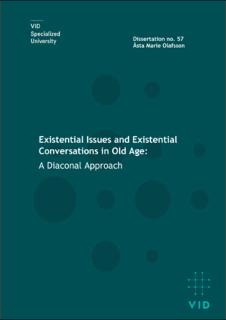| dc.description.abstract | The thesis qualitatively explores existential issues and existential conversations in old age from a diaconal perspective. It is placed within the science of diaconia, with the psychology of religion and existential psychology as its main perspectives. The study is divided into three hermeneutical substudies. The first is based on individual interviews with 11 older people aged 73 to 91 years, while the two others are based on three focus group interviews with 18 deacons within the Church of Norway. Regarding analysis, Sub-studies 1 and 2 are based on thematic analysis, while Sub-study 3 is inspired by qualitative content analysis.
Sub-study 1 explores older people’s reflections on existential issues and their possible need to discuss them with others, adding new knowledge to empirical research in a Norwegian context. The theoretical framework includes Yalom’s ultimate concerns and Tornstam’s theory of gerotranscendence. Findings from Sub-study 1 show that the participants were mostly satisfied with life, a few were lonely, and most were not afraid of death. Meaning was primarily experienced on a horizontal rather than a vertical level. Due to life events and illness, a few of the participants experienced an increased interest in existential issues in old age, and a few wanted to talk about existential issues with others.
The second sub-study explores deacons’ conceptual understandings of existential conversations with older people and what terms they use for these conversations. We found that the deacons experienced a gradual transition between existential conversations (ECs) and pastoral care conversations (PCCs). ECs were perceived as broader than PCCs. The deacons also made a demarcation between pastoral care on the one hand and existential and spiritual care on the other, especially for people with dementia. Lastly, the deacons used different terms for their conversations with older people depending on whom they talked to. We thus interpreted the deacons to use language strategically and pragmatically.
In Sub-study 3, we explored the deacons’ perceived competence as conversation partners with older people. The deacons emphasised their relational skills and conversation skills, existential and religious literacy and having time as a resource. We introduced the term “approachable deacons” as an analytical innovation. Based on the empirical material and the perspectives from diaconia and the psychology of religion, arguments are made for how the deacon profession can contribute to societal mental health.
The dissertation meets the demand for empirical research into the science of diaconia. There is scant Scandinavian empirical research on deacons as existential conversation partners, nor on older people’s reflections and experiences of existential issues. Furthermore, much of diaconal research is focused on social work, congregational work or institutional work, whereas my contribution is at the 9 service and professional levels rather than the organisational level. The innovation of this thesis is its clear existential health perspective in combination with diaconia and heterotopia.
Paper I: Olafsson, Å. M., & Rykkje, L. (2022). Existential Issues in Old Age as Narrated by Older People – An Interview Study from Norway. Religions, 13(3), 259. https://doi.org/10.3390/rel13030259
Paper II: Olafsson, Å. M., Stifoss-Hanssen, H., & Austad, A. Deacons' perspectives on "the existential" and existential conversations with older people. (Submitted to Diaconia. Journal for the Study of Christian Social Practice September 2023)
Paper III: Olafsson, Å. M., Stifoss-Hanssen, H., & Austad, A. (2022). Deacons as conversation partners on existential issues with older people. Tidsskrift for praktisk teologi, 39(2), 21–36. doi: https://doi.org/10.48626/tpt.v39i2.5499 | en_US |
